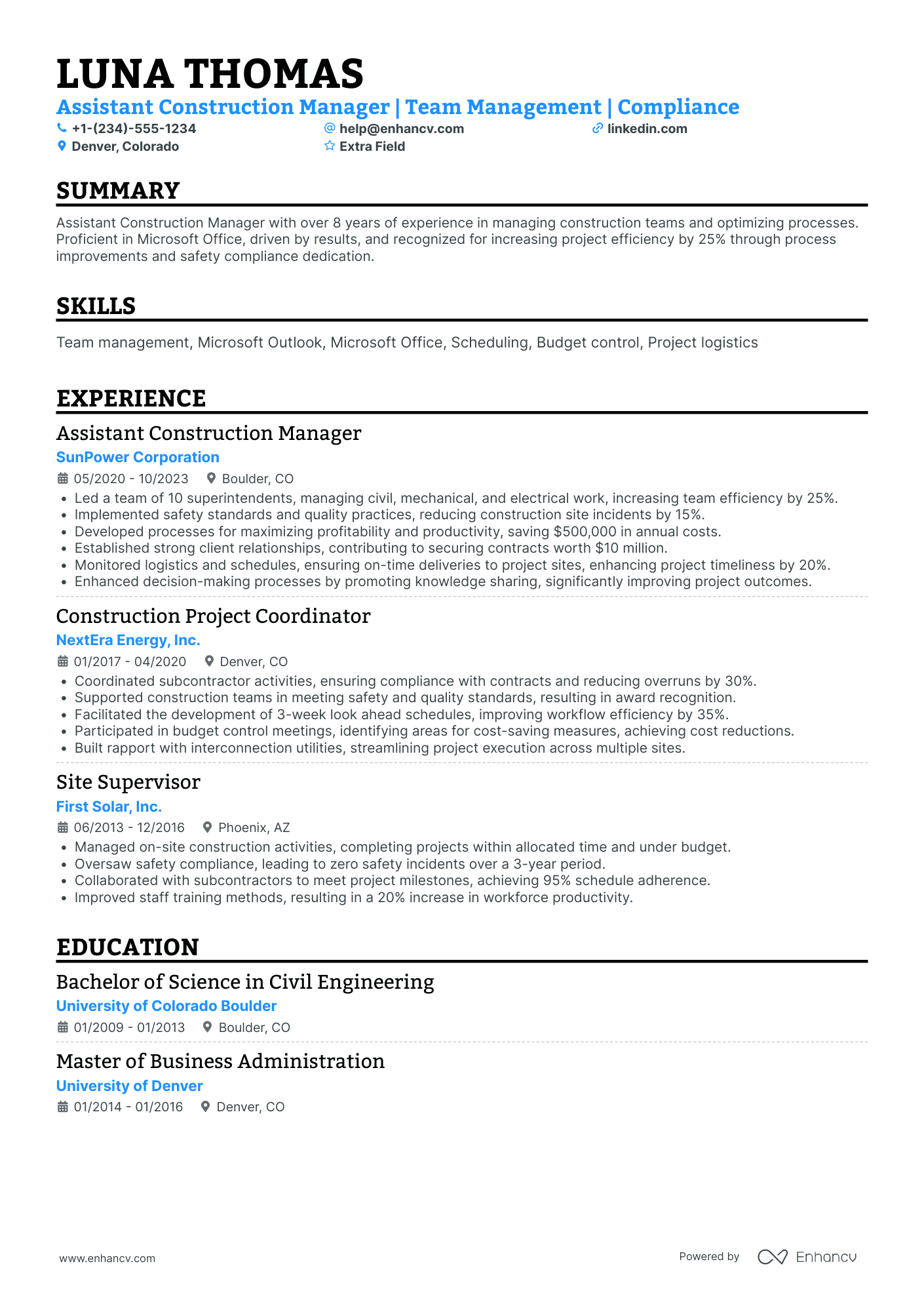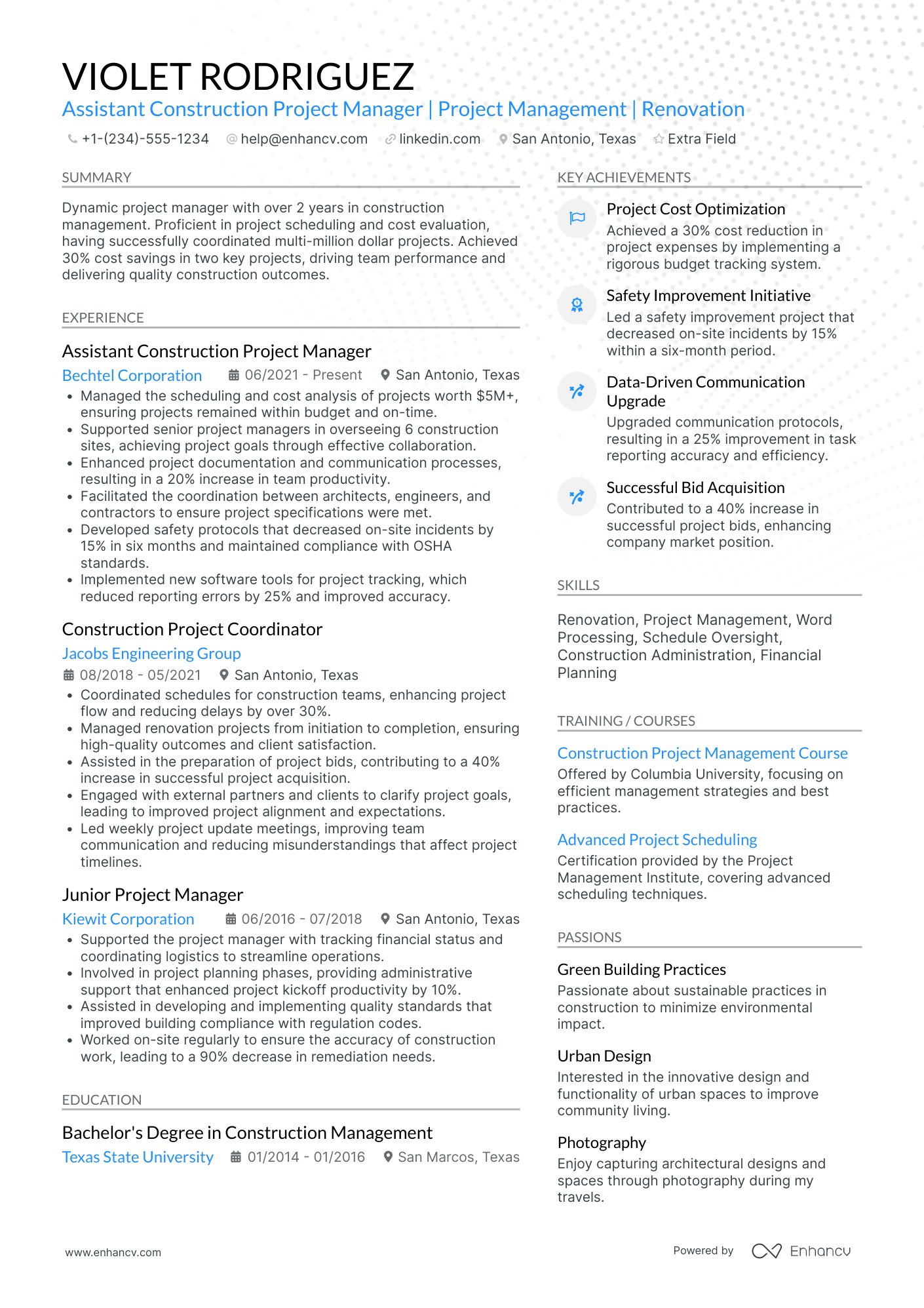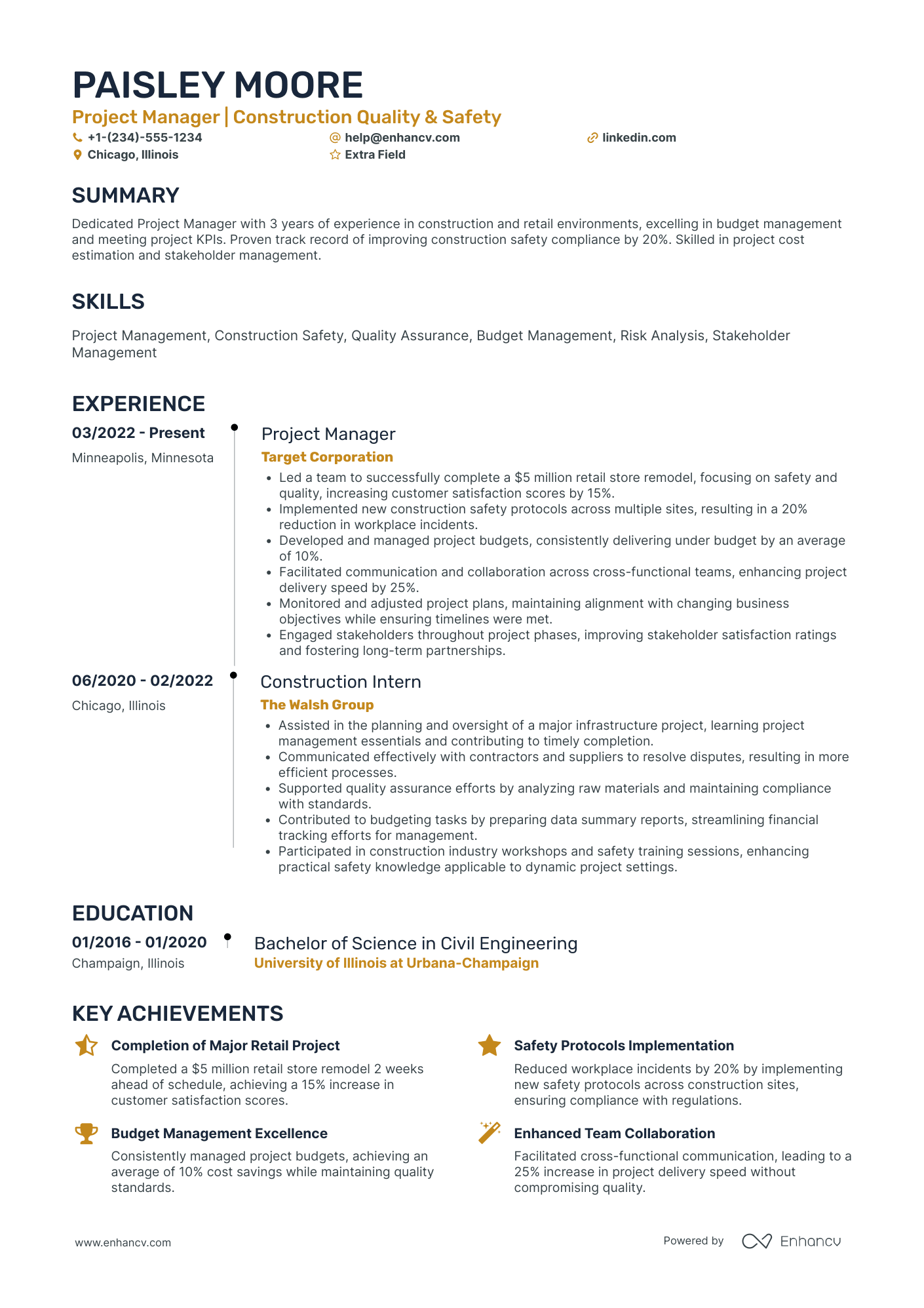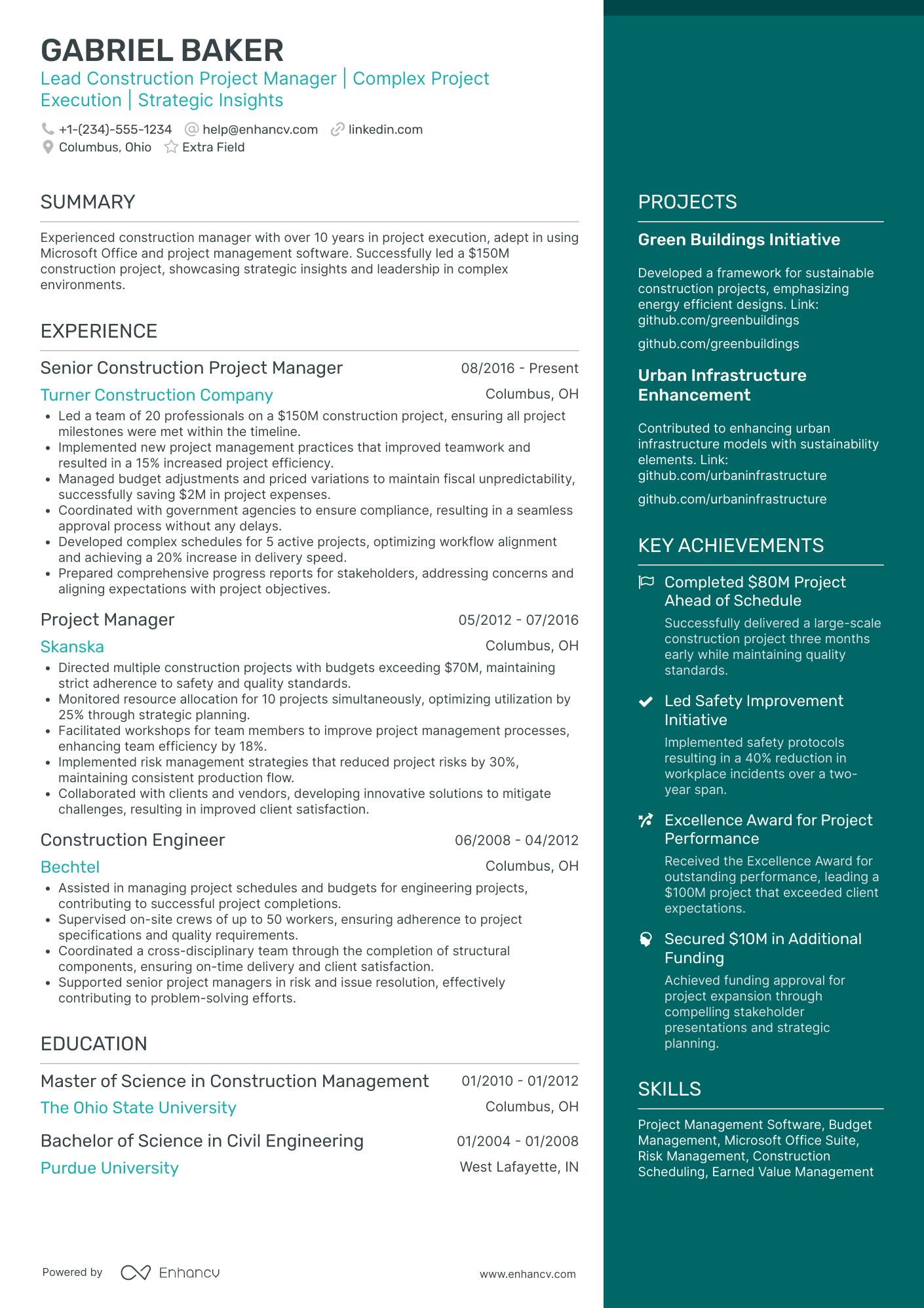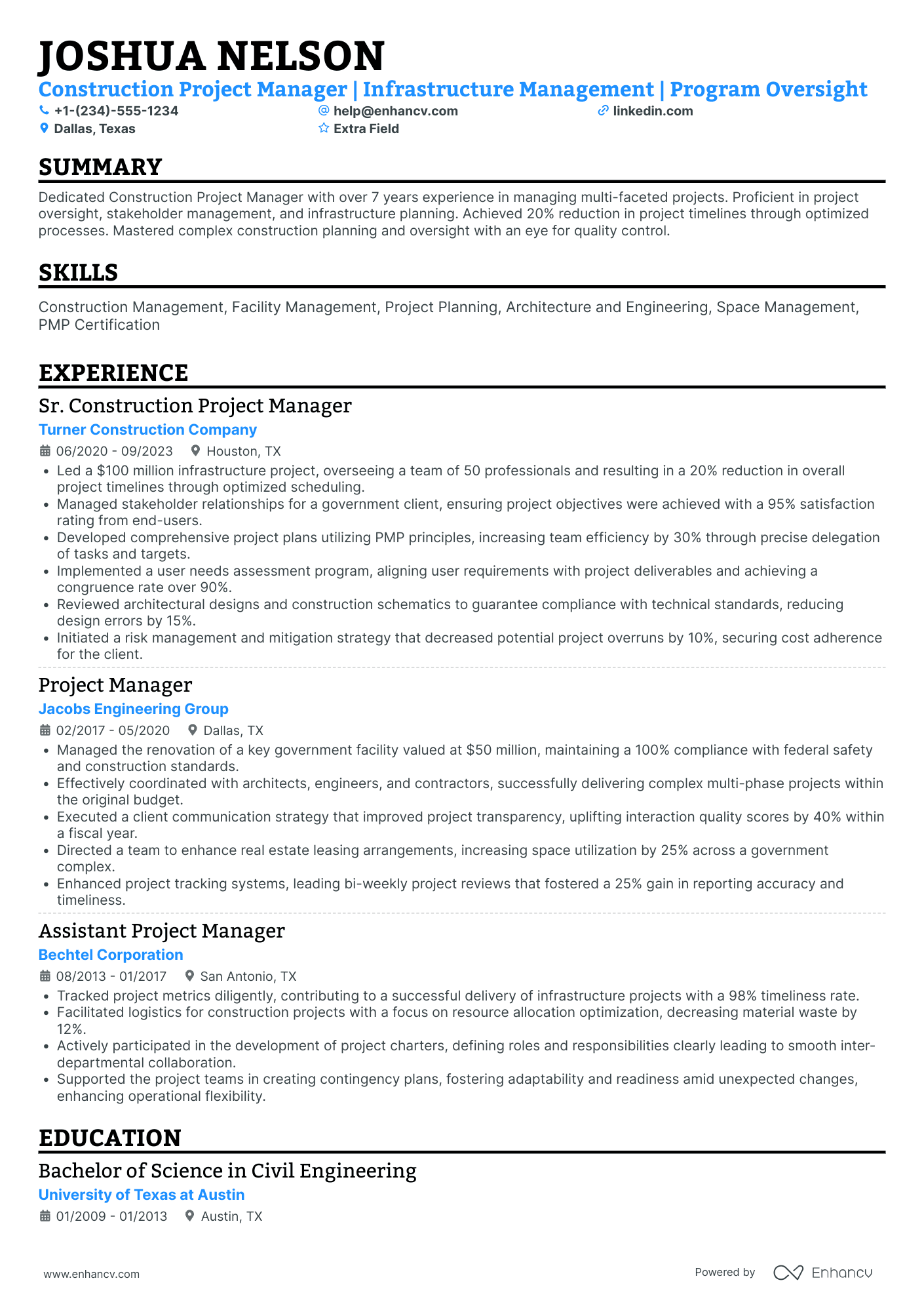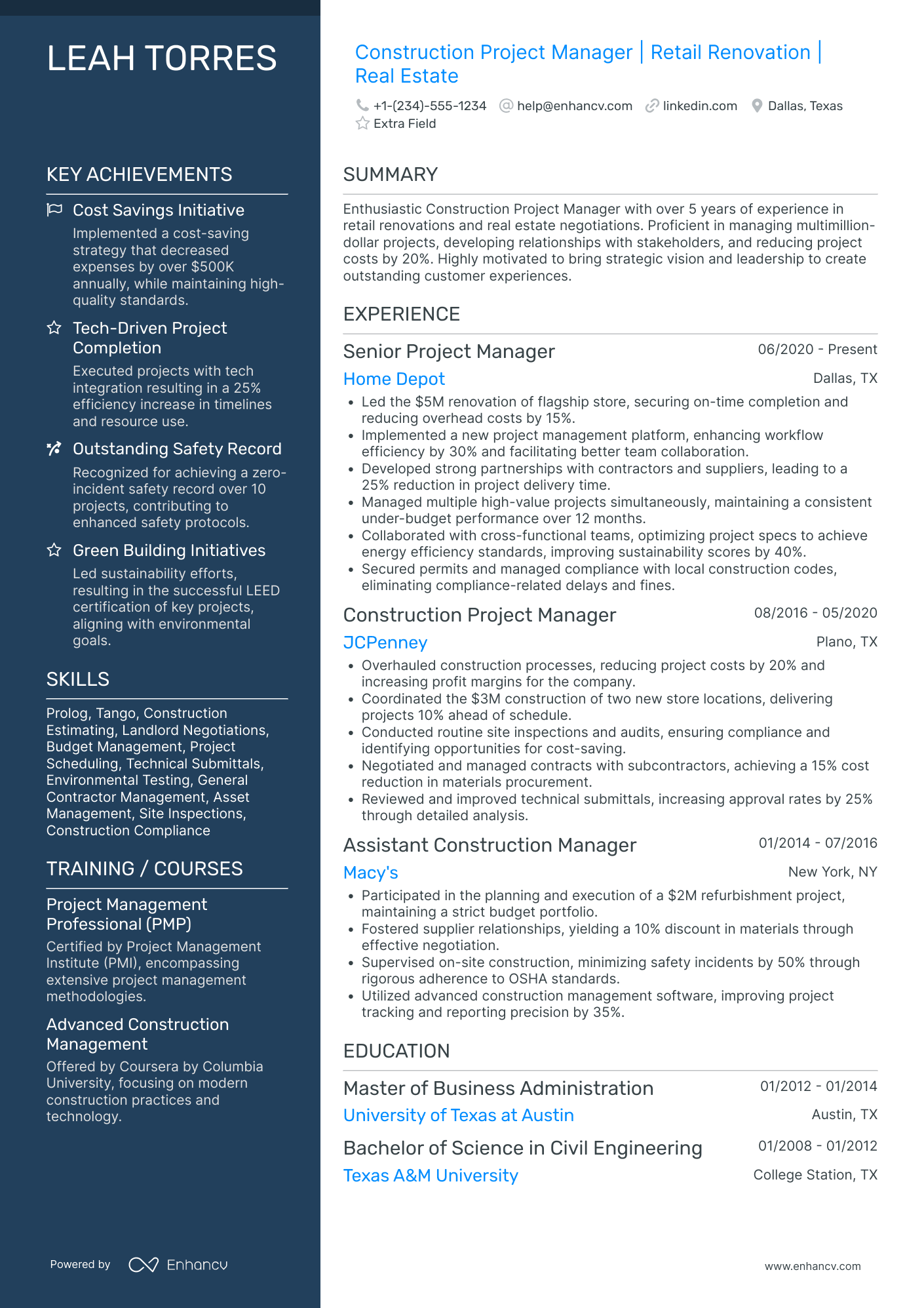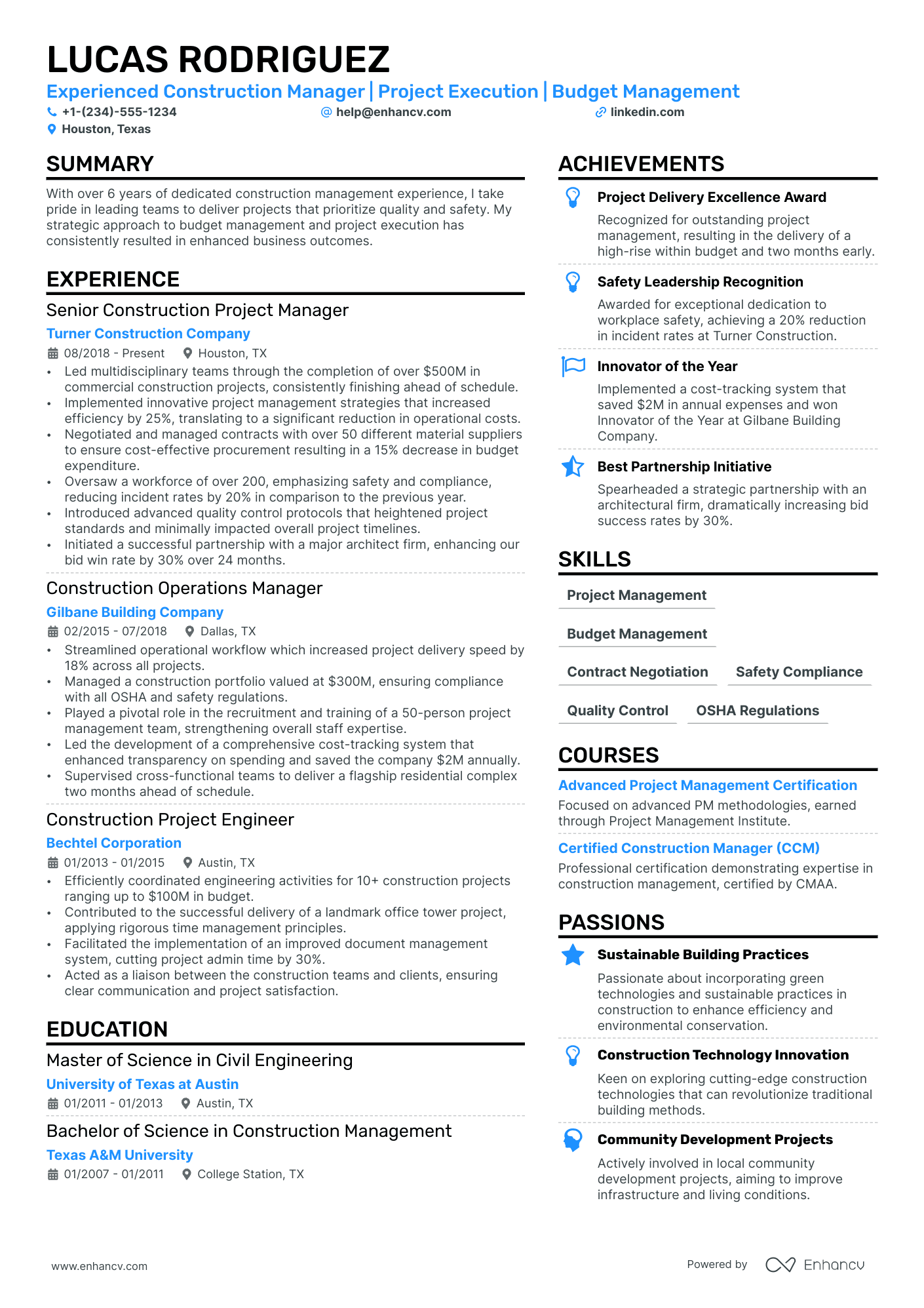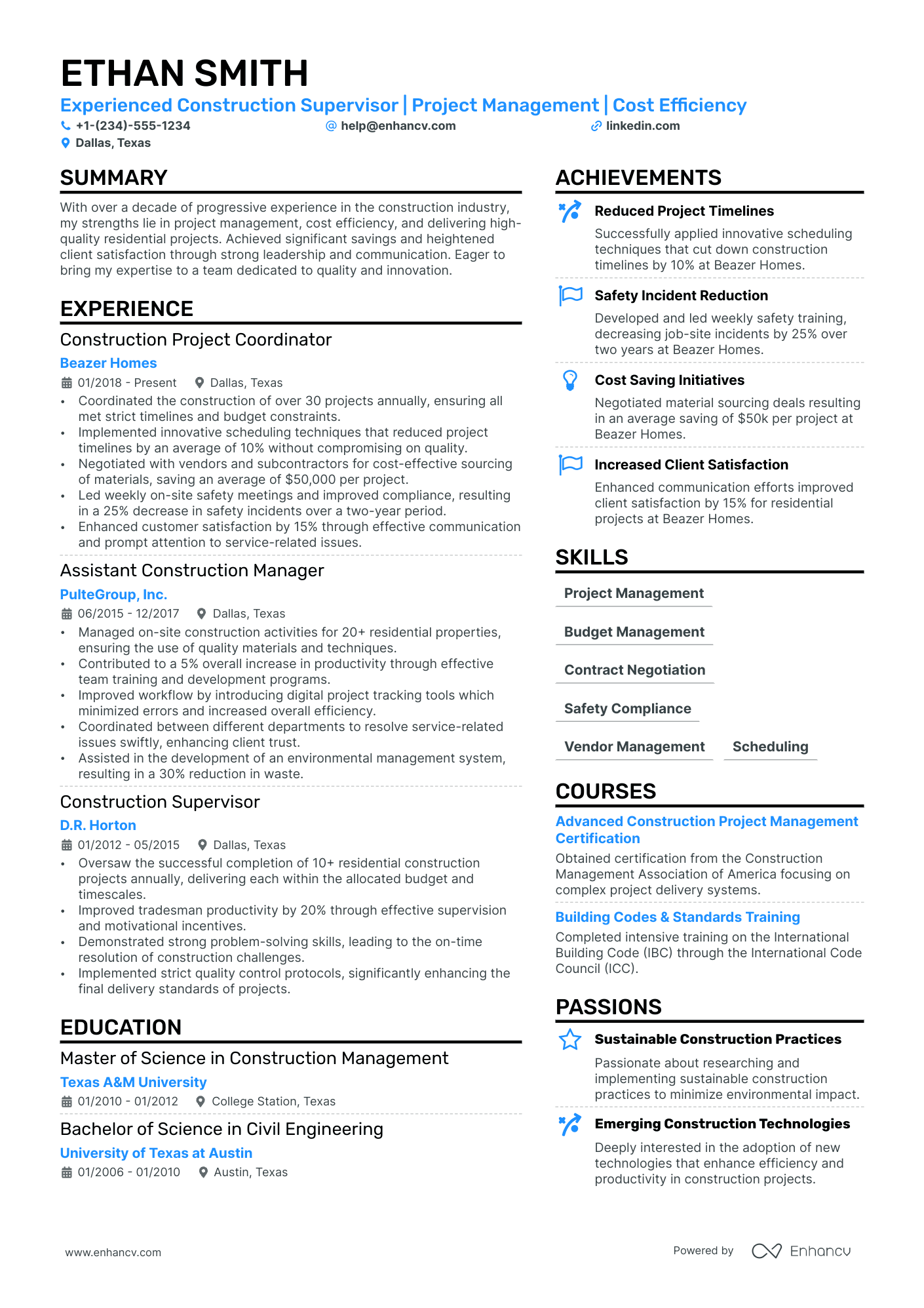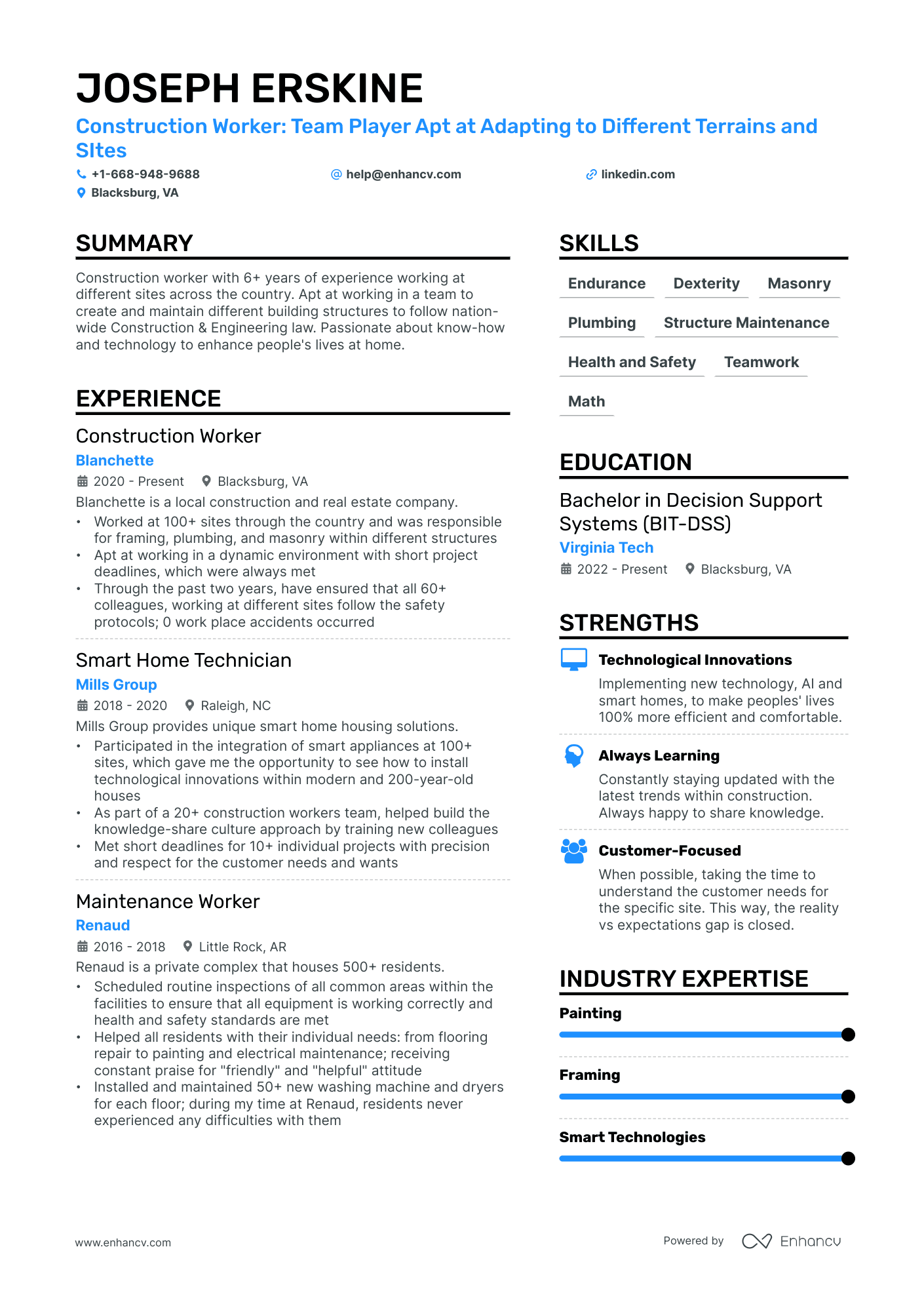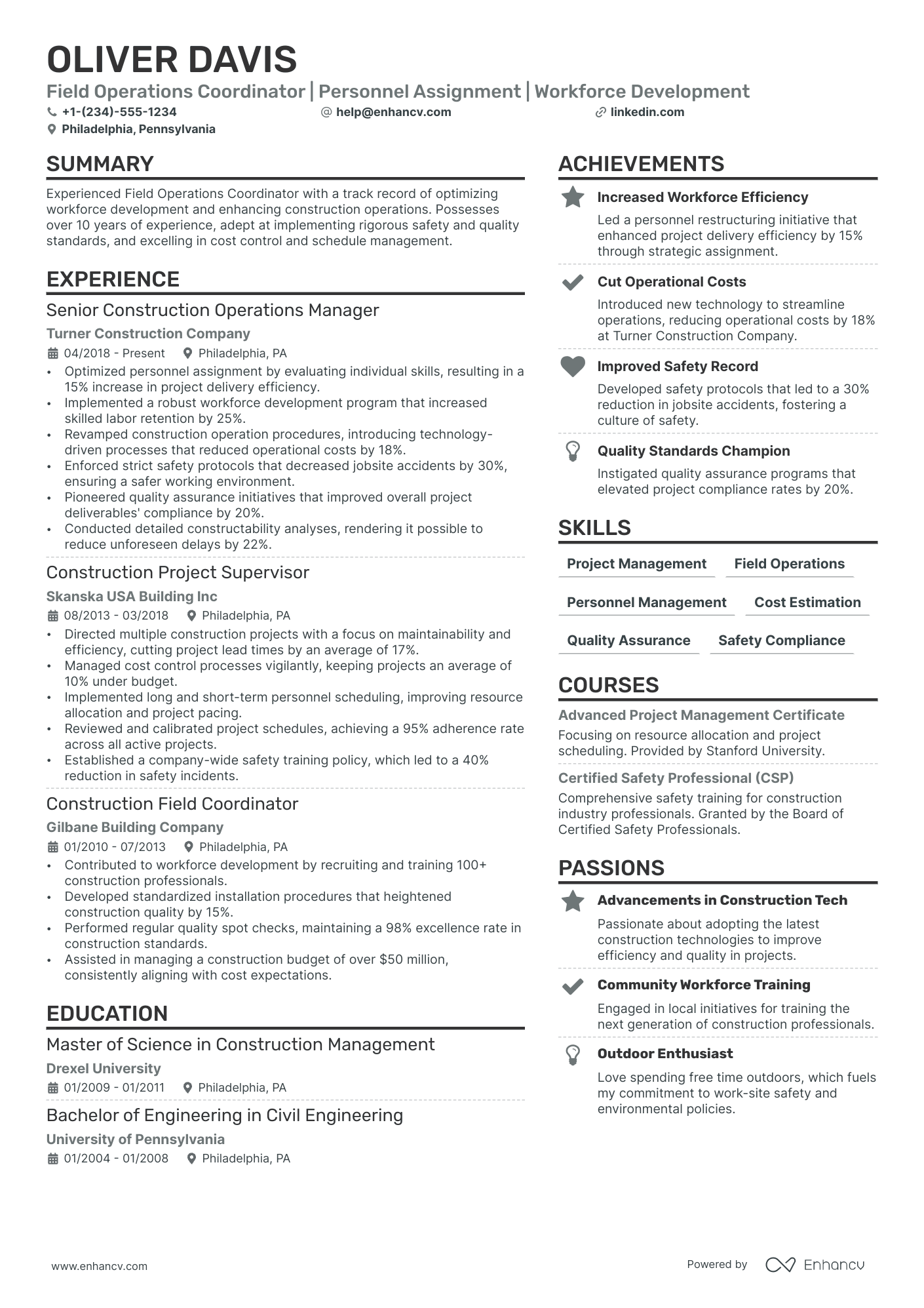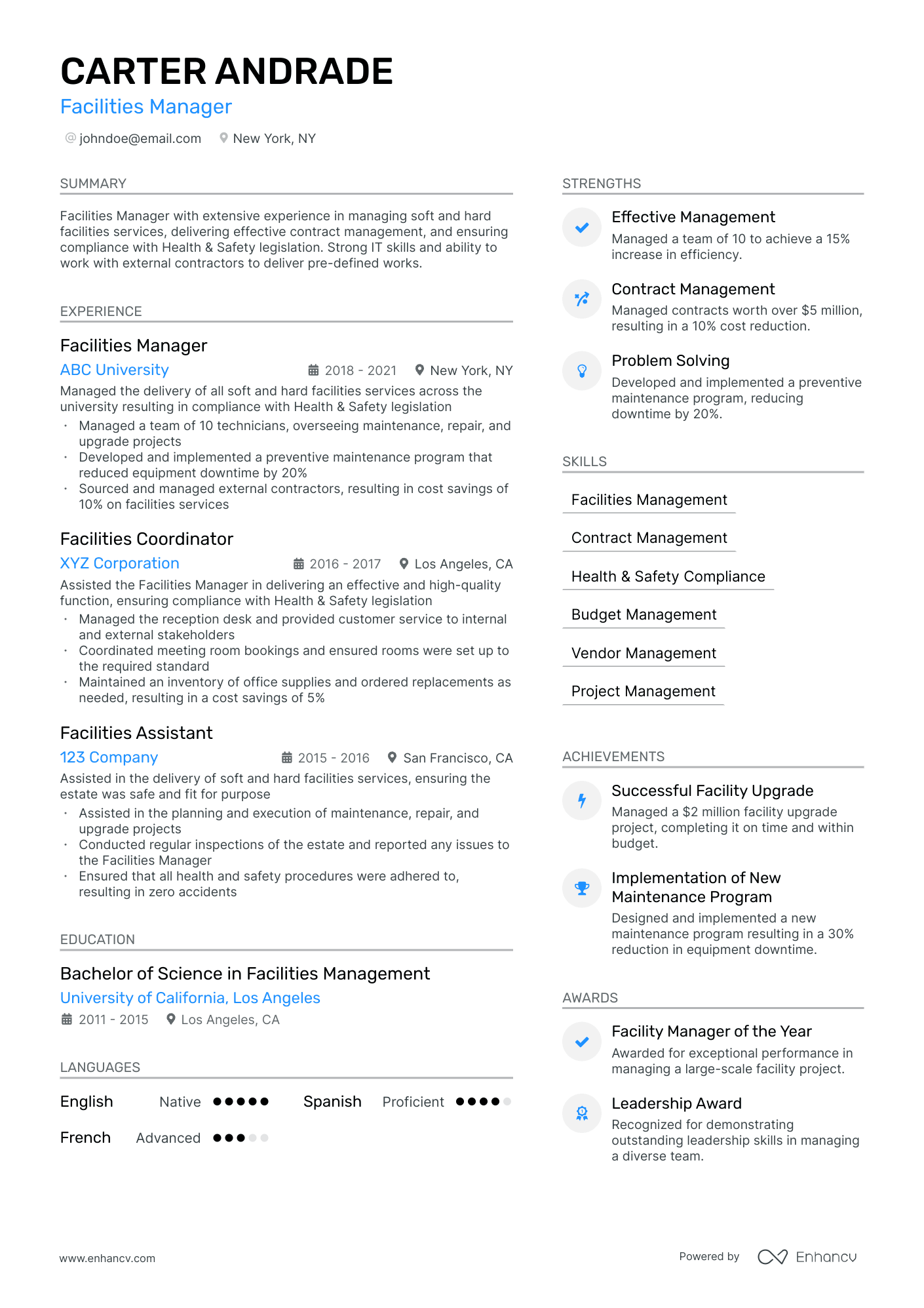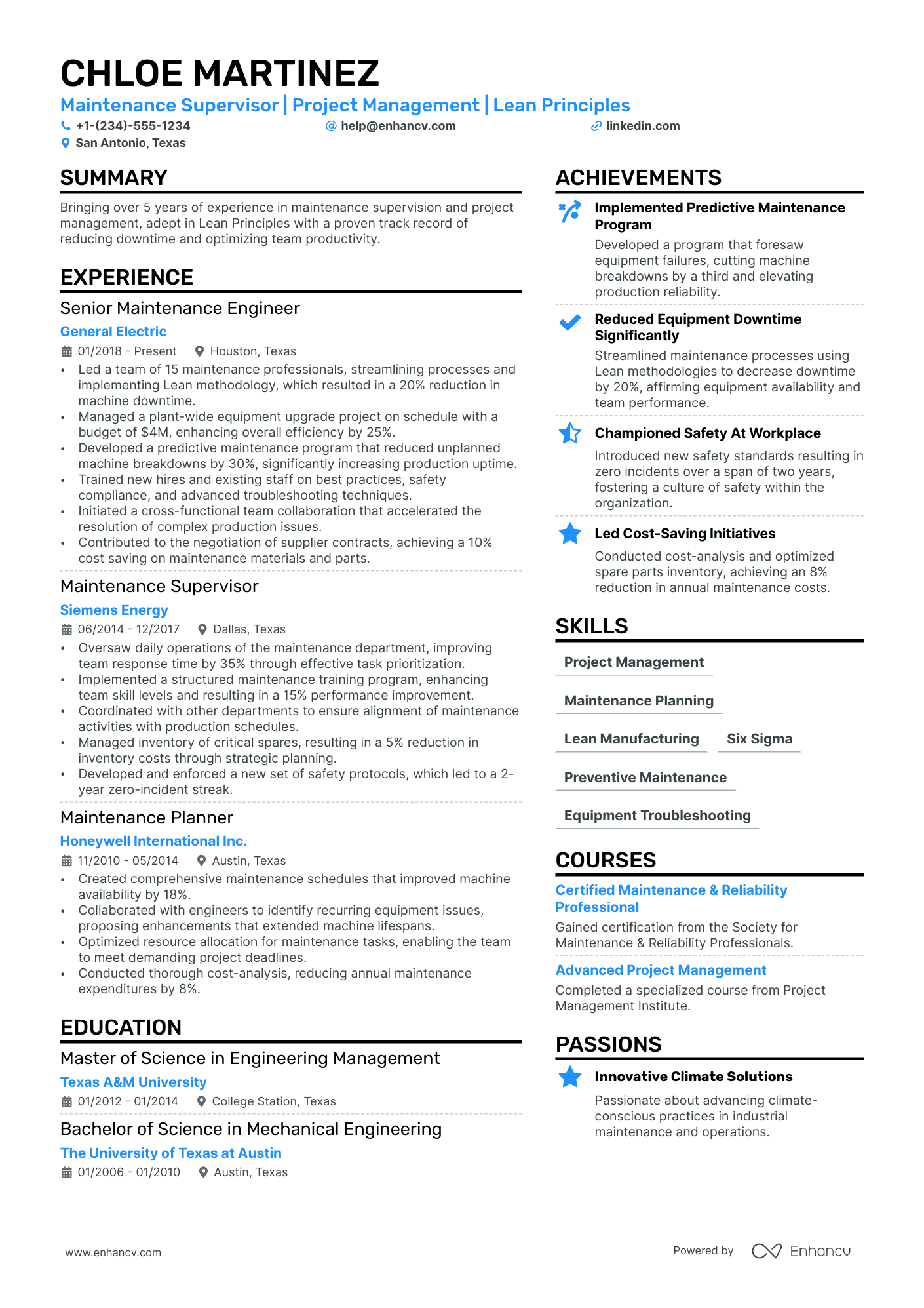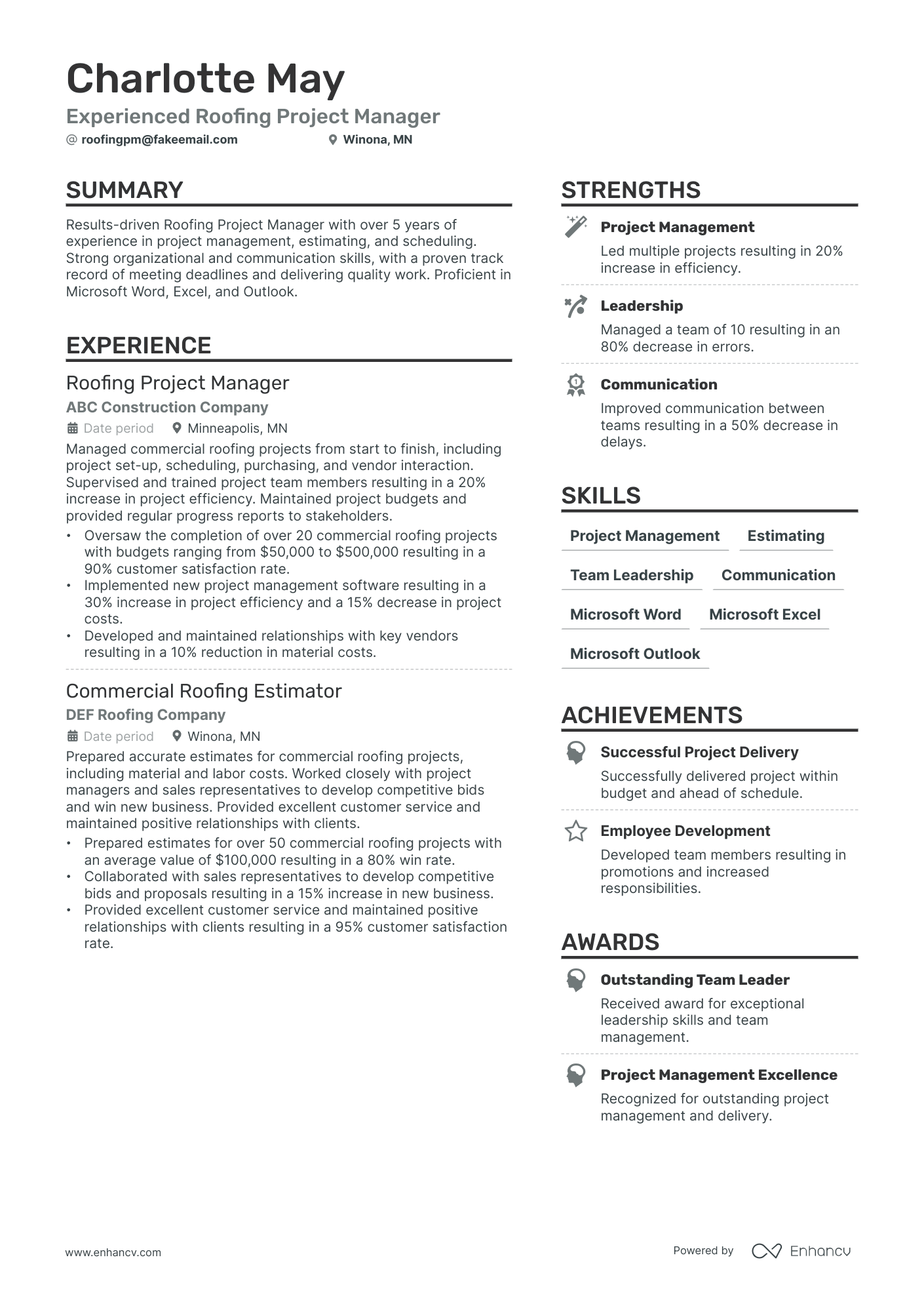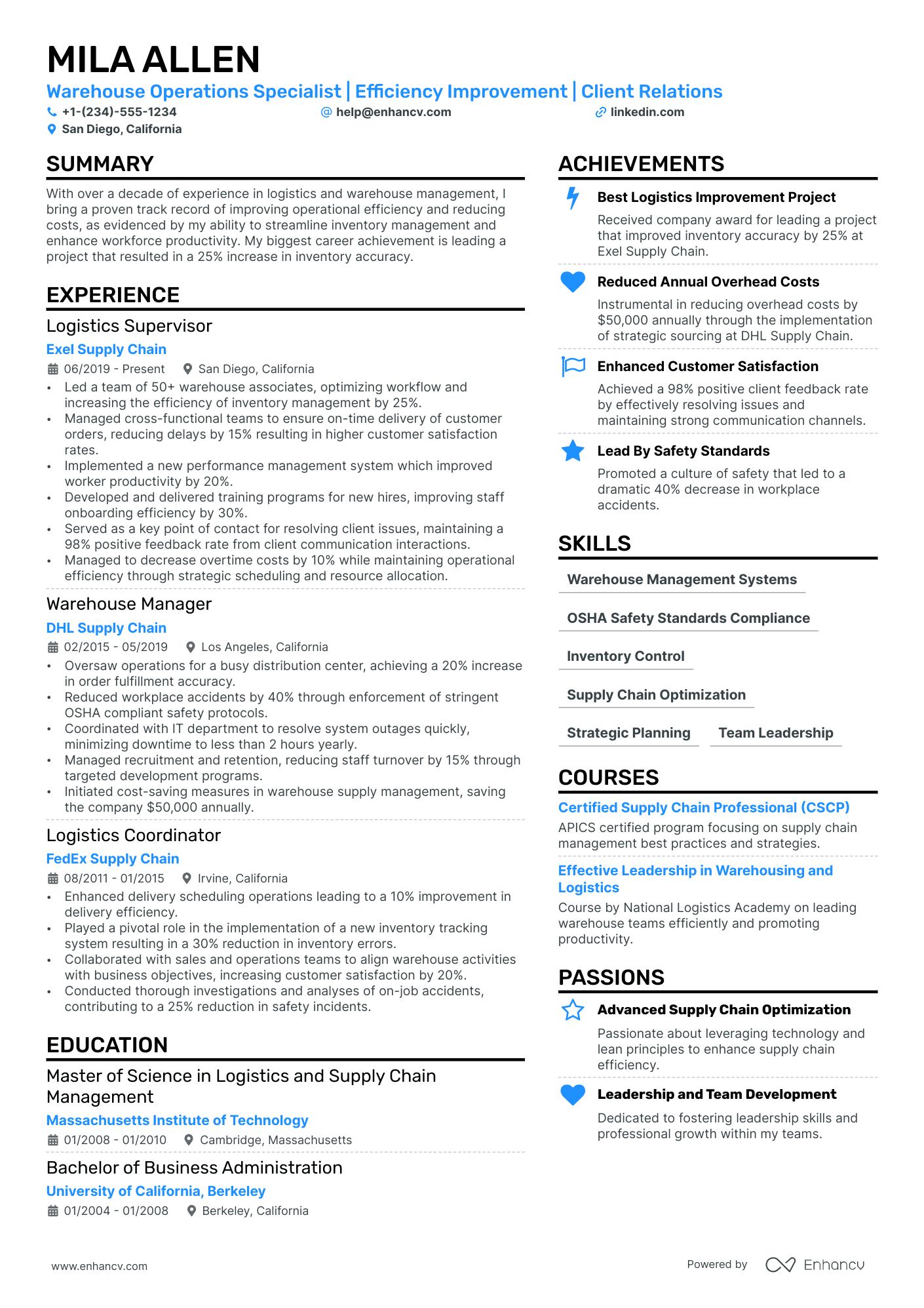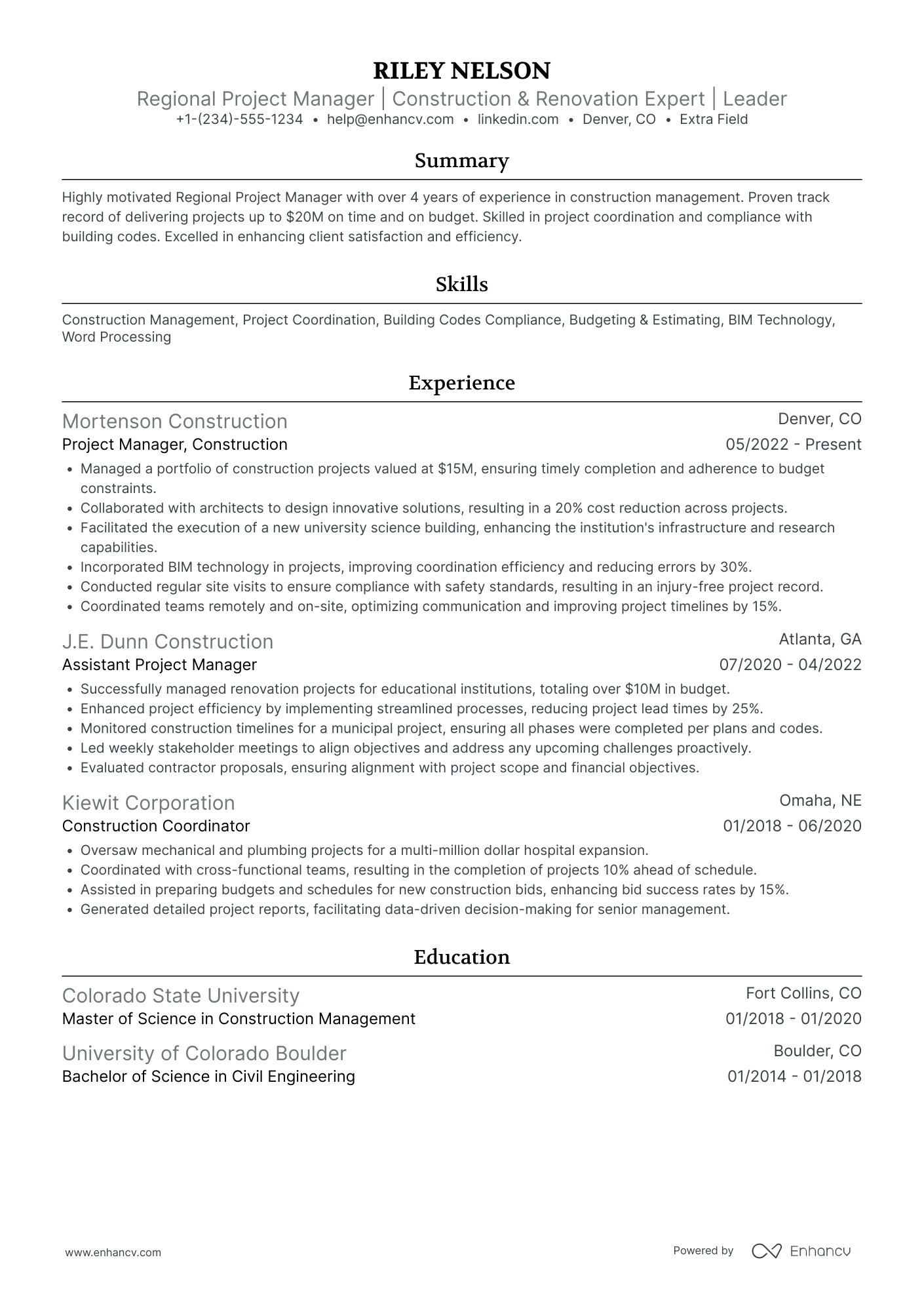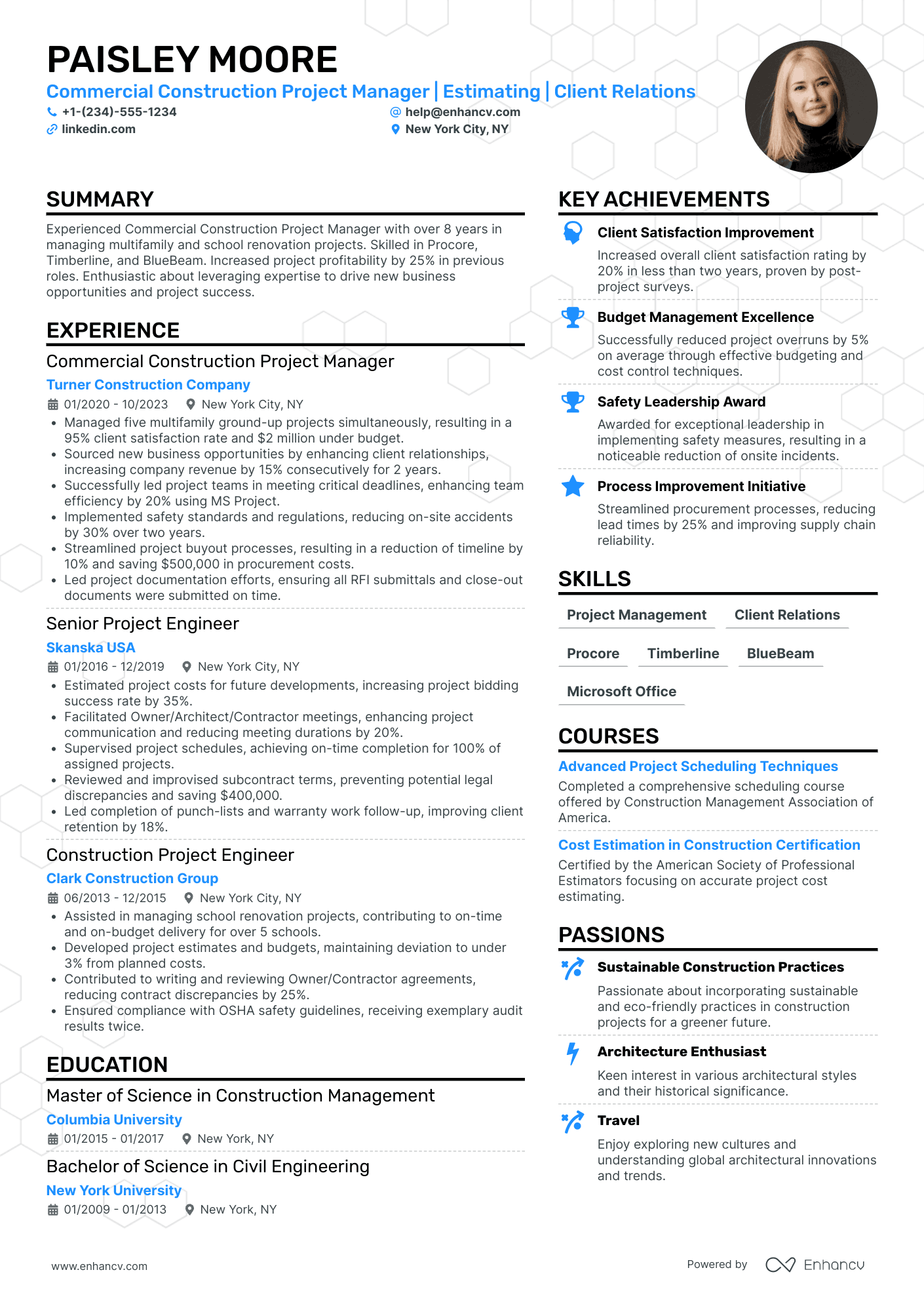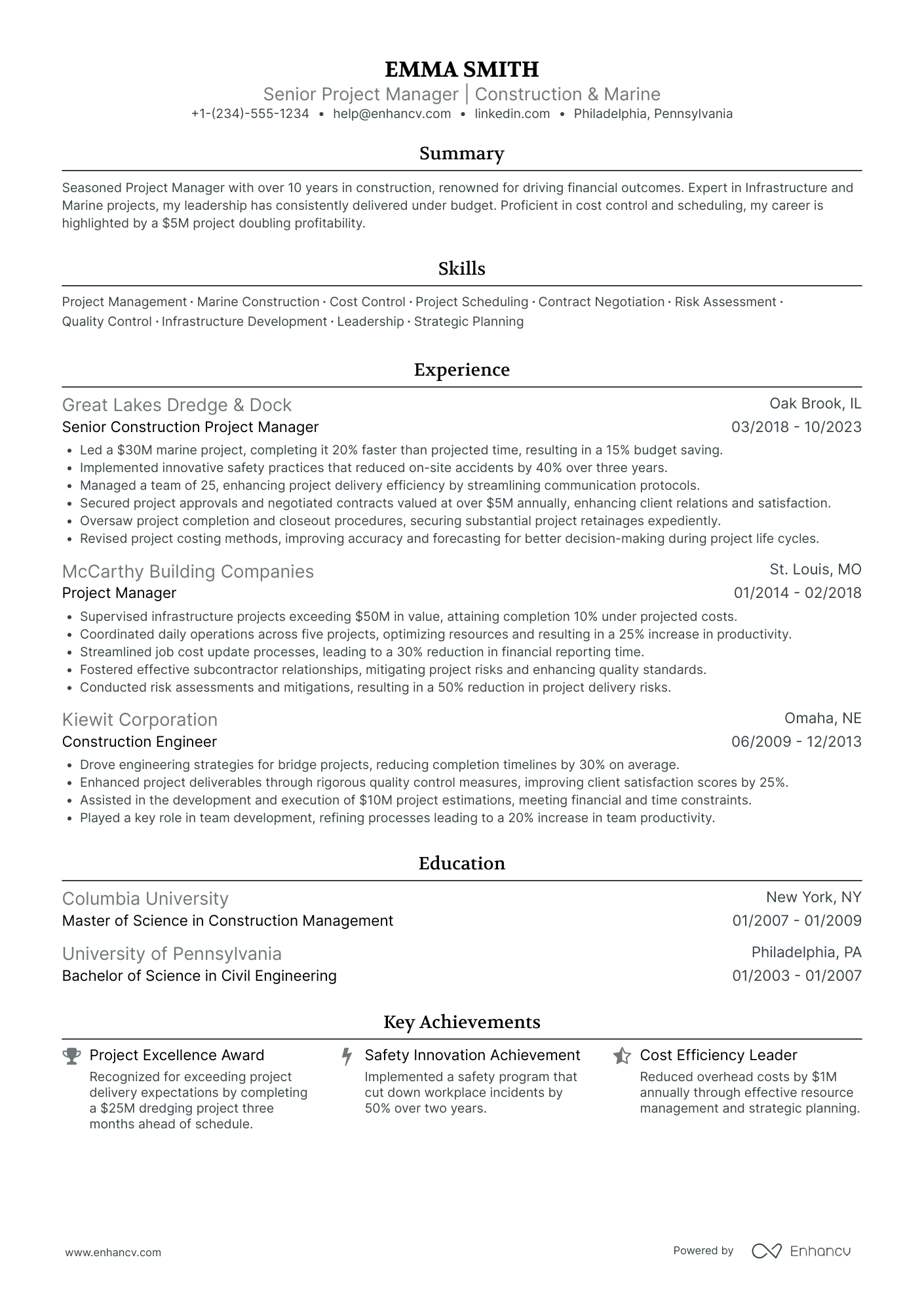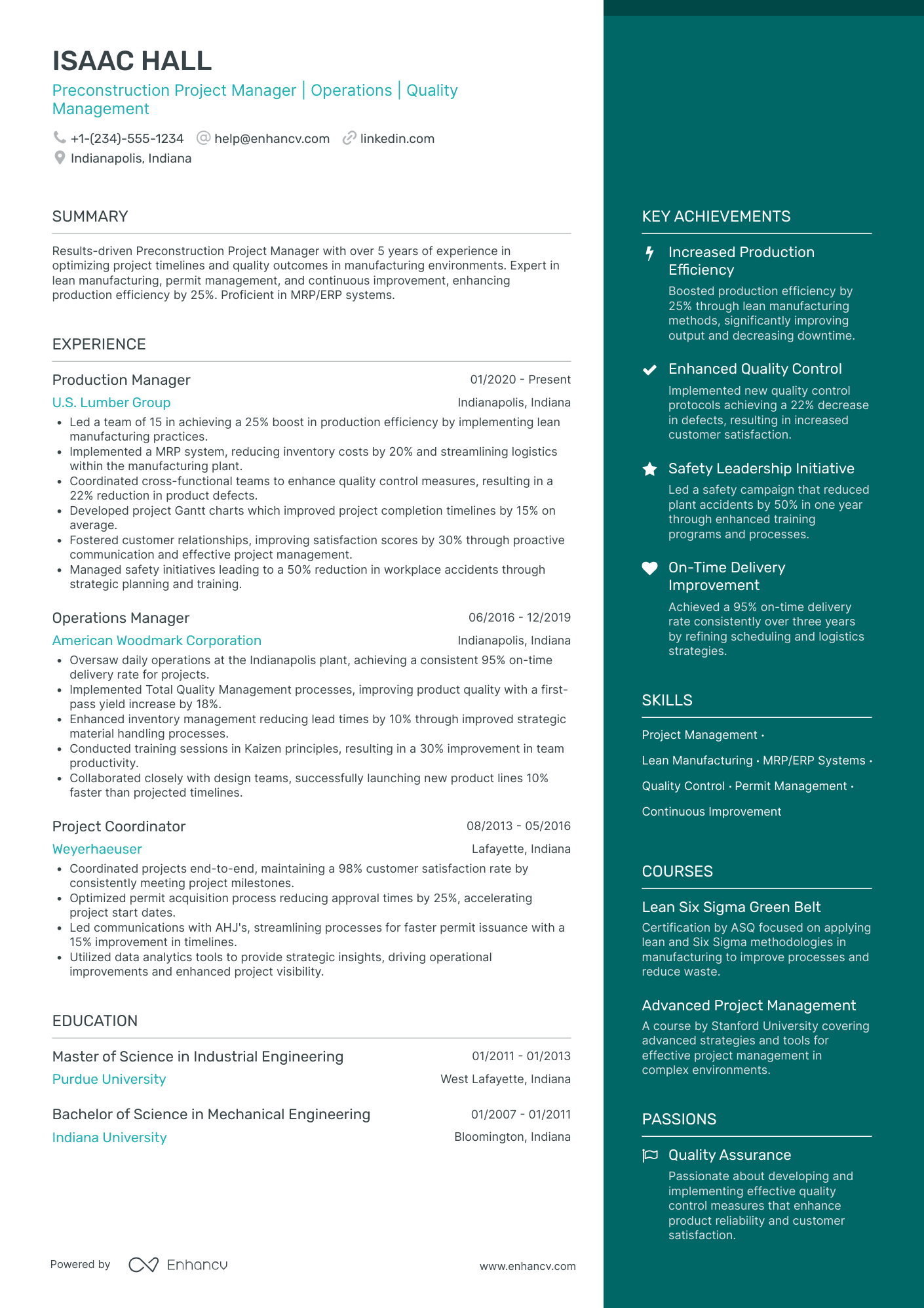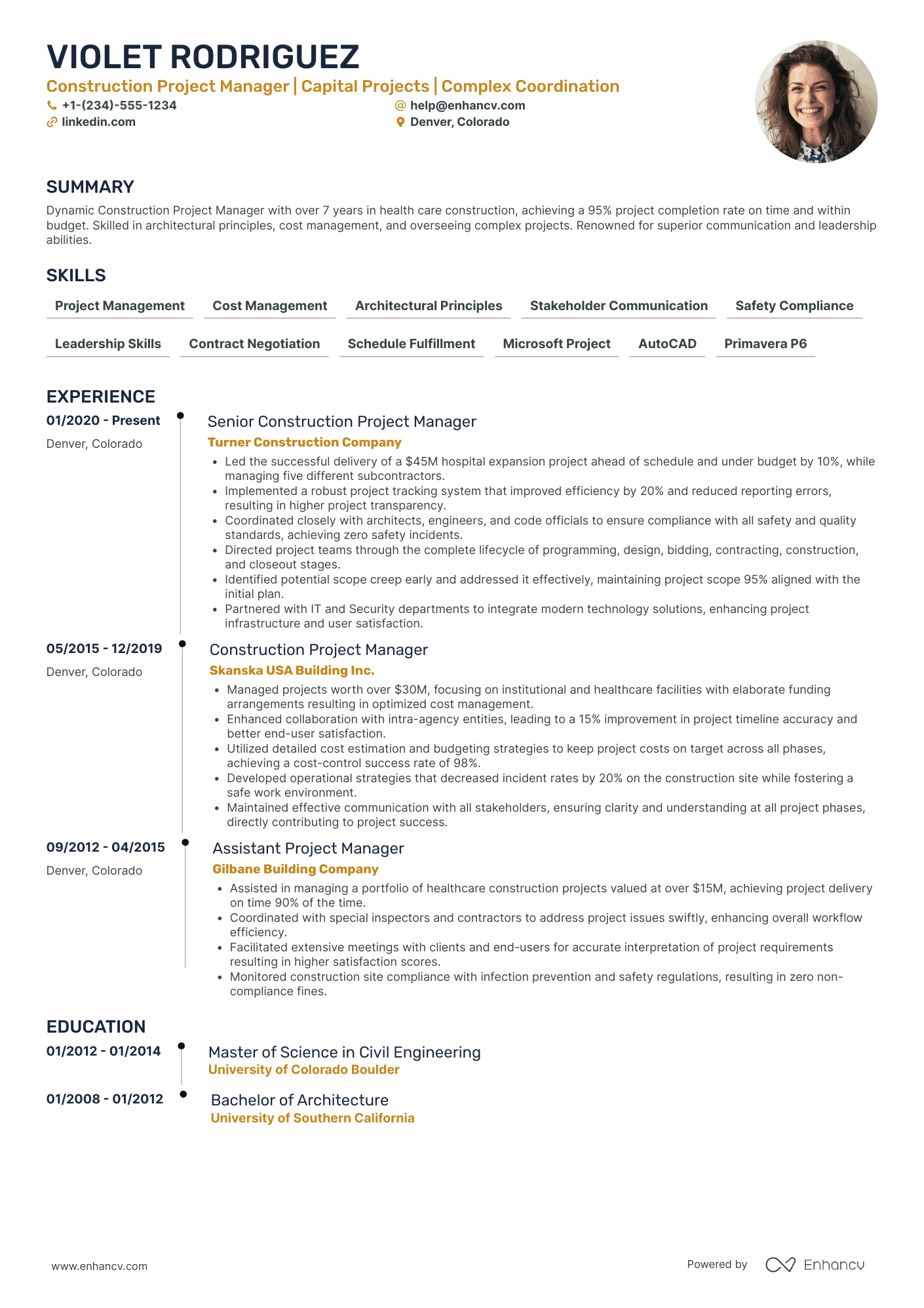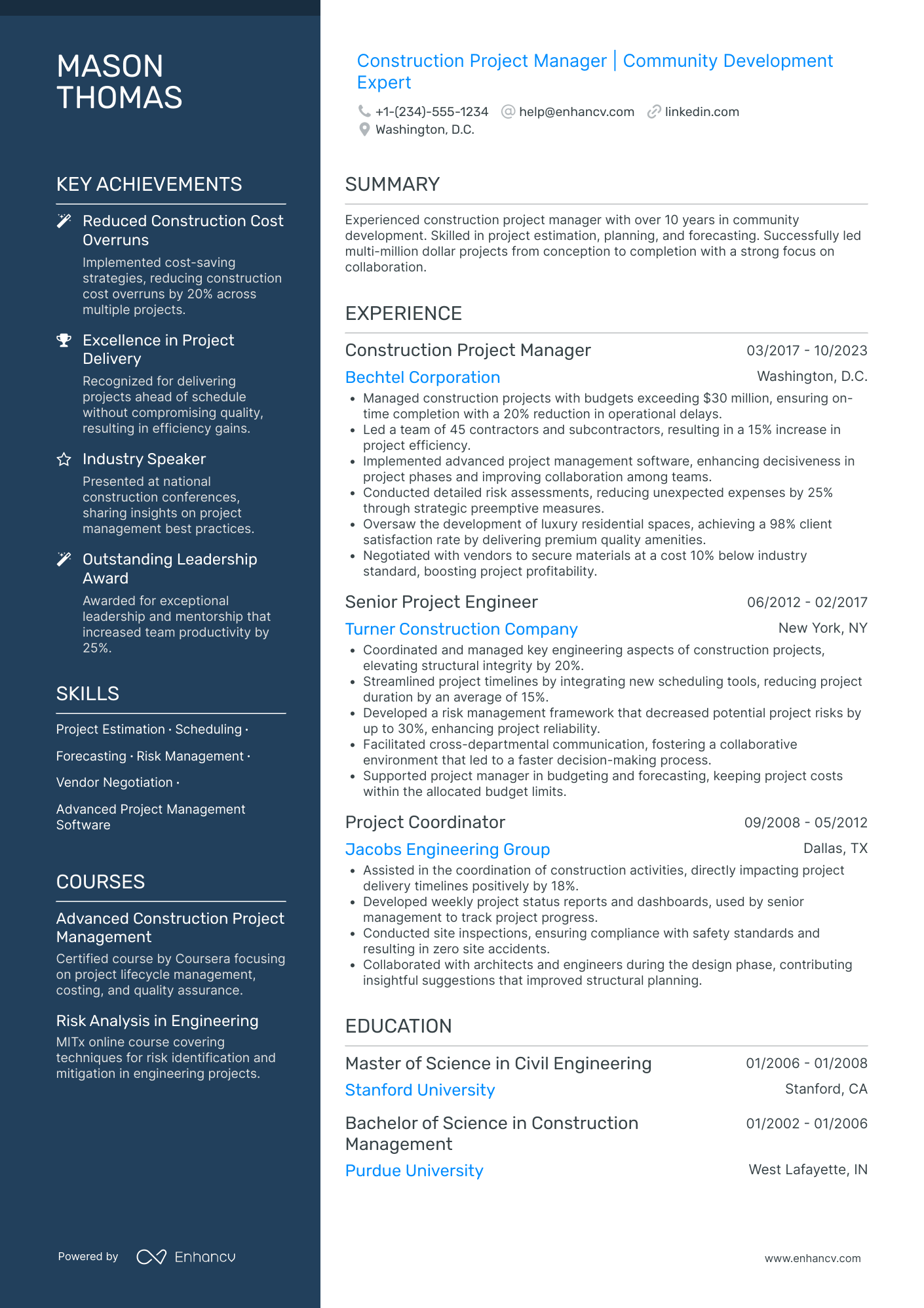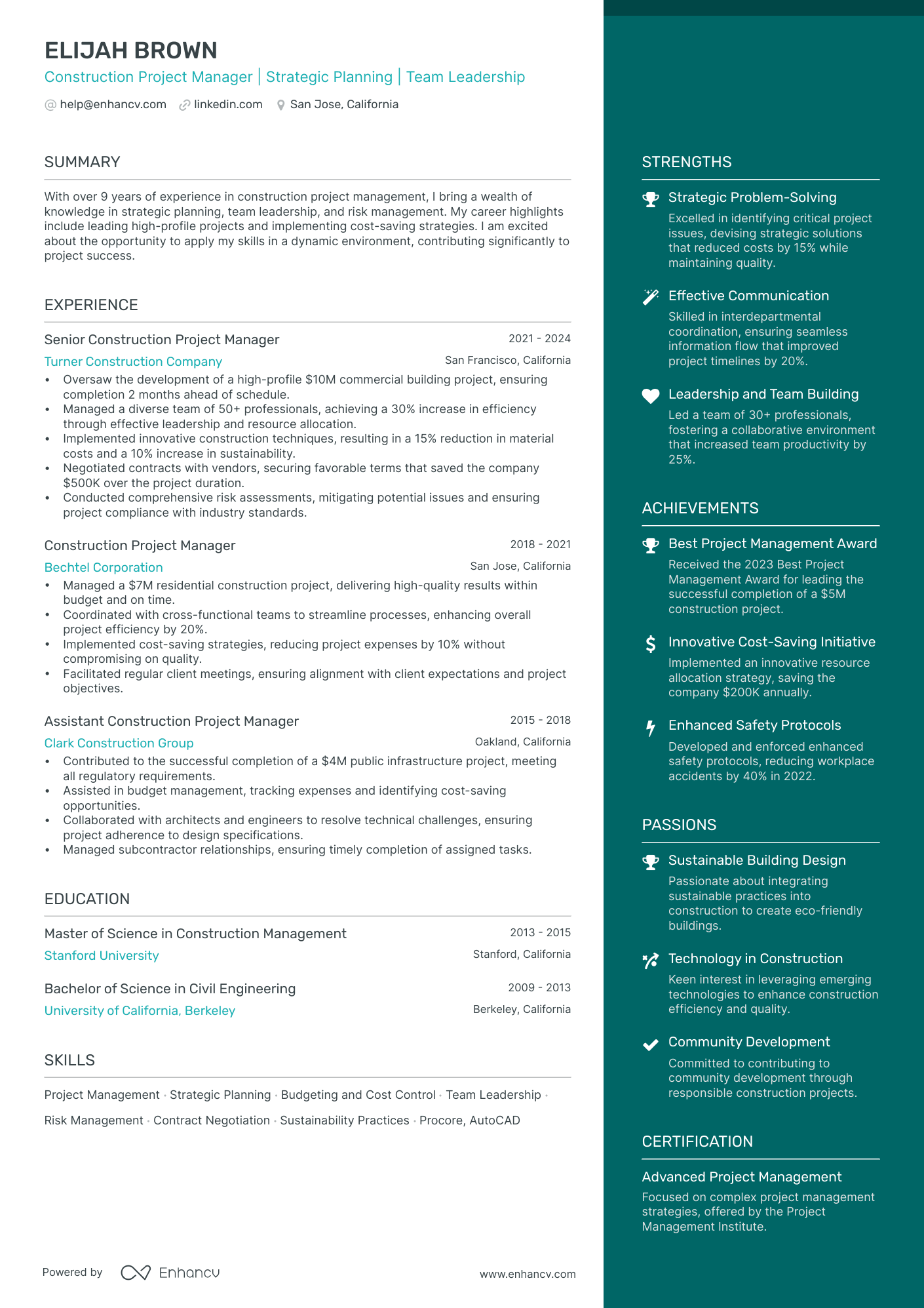Construction project managers don’t get the recognition they deserve. What people don’t know is that once the planners finish hammering out the details, everything gets passed to you. You draw up a timeline and oversee the entire operation, so everything is done on schedule.
It’s a thankless job but an important, high-paying, and in-demand one, nonetheless. After years of delays due to COVID-19 and supply-chain challenges, the industry is booming again.
It’s time you get used to bragging about your accomplishments, because you’ll need it to write a kick-ass construction project manager resume experience.
Don’t worry if you don’t know where to start. We’ve got a detailed blueprint for you here:
- The best construction project manager resume template
- How to pick which hard and soft skills to list
- How to write an attention grabbing but not too long construction project manager resume summary
- What to write on your resume experience section if you have no experience
- How to quantify details on your resume work experience, especially for soft skills like leadership and problem solving
We also have a ton of guides for different roles in the construction industry, such as:
- Construction administrative assistant resume & guide
- Construction manager resume & guide
- Construction superintendent resume & guide
- Construction general manager resume & guide
- Construction manager cover letter & guide
Construction project manager resume example
Here's what this applicant does well in their resume:
- Highlighting significant achievements: Successfully oversaw a high-profile $10M commercial building project, completing it 2 months ahead of schedule.
- Demonstrating leadership skills: Managed a diverse team of 150+ professionals, enhancing efficiency by 30% through effective leadership and resource allocation.
- Showcasing project management expertise: Implemented innovative construction techniques, resulting in a 15% reduction in material costs and a 10% increase in sustainability.
How to format a construction project manager resume
A solid foundation is important for any high-rise project, right? It’s the same with formatting your resume. Font size, heading placements, and where you put each section matter.
Use thereverse-chronological format for your resume as this is the most recognized format. If you had a lot of project-based or part-time work and some of them overlapped, it’s better to organize your resume work history in two sections — one for full-time work and another for project-based and part time gigs. This prevents recruiters from getting confused with overlapping employment dates.
Here are 5 points to remember when formatting your resume:
- Use a professional email address and check that your listed number is correct
- Use easy-to-read fonts like Montserrat, Volkhov, and other popular serif fonts. These are the best font choices because they’re ATS-friendly and easy to read, as the letters aren’t jumbled too close. Cursive fonts are a no-go, even for headings.
- Save your resume in a PDF or Word Format. Some employers have a preference, so check the job ad to make sure.
- Leave plenty of white space in the margins and between sections or headings.
- The heading should be a tad bigger than the regular text font so it stands out.
Demystifying the Applicant Tracking System (ATS)
There’s a lot of fear mongering going around Tiktok saying applications will get rejected without the right keywords.
Nope, the ATS isn’t the one calling the shots. It’s just a filtering tool, like how Google crawls millions of contents based on keywords provided. Does this mean you shouldn’t bother putting keywords on your resume? Of course not! That’s not what we’re saying here. Just don’t waste all your efforts into weaving keywords on your resume.
See, if your resume has the right keywords, it will pop up on the recruiter’s search results. But then, they’ll have to read it to see if it meets the requirements. If you think about it, the text surrounding those keywords matters more.
And whatever you do, don’t put a bunch of keywords at the bottom of your resume and change the text to white so it’s invisible to the naked eye but can still be picked up by the ATS. That will backfire on you.
Keep in mind market-specific formats – for example, a Canadian resume might follow a different structure.
If you’re still not sure if your resume is good or not, check how it compares to hundreds of real-world construction project manager resumes at Enhancv resume checker.
Is your resume good enough?
Drop your resume here or choose a file. PDF & DOCX only. Max 2MB file size.
So how did your resume fair against the competition?
Don’t fret, you still have a chance to improve it. Keep reading and we’ll show you a step-by-step guide .
Let’s first discuss the top sections hiring managers want to see on your resume:
The top sections on a construction project manager resume:
- Professional summary: This gives a succinct overview of your experience in the construction industry, such as the type of builds you oversaw, and your unique management style. The goal is to capture the recruiter's attention.
- Core competencies: Highlight relevant knowledge and skills such as construction project management, project planning, and contract negotiation.
- Professional experience: Detailing your construction project management experience allows recruiters to assess your qualifications and track record.
- Project portfolio: Include a section with pictures of past projects with spec drawings and work breakdown structure (WBS) to show the different phases of the project.
- Certifications and education: Showing your relevant educational background and professional certifications, such as Project Management Professional (PMP) or Certificate of Management Lean Construction (CM-Lean), validates your technical competence in construction project management.
What recruiters want to see on your resume:
- Proven experience: Recruiters prioritize candidates with proven experience in managing construction projects like the ones they handle.
- Project management certification: A PMP, Certified Associate in Project Management (CAPM), or similar certification demonstrates a candidate's commitment to professional development and understanding of industry-standard project management methods.
- Technical skills: In-depth understanding of architectural designs, construction materials and methods, cost estimation, etc., are highly valued because it gives employers confidence that the candidate can execute the build effectively.
- Leadership qualities: The ability to lead, motivate, and coordinate people is crucial as construction project managers often manage people of different socio-economic backgrounds and skill sets.
- Problem-solving skills: Construction projects often encounter unexpected issues so recruiters prioritize candidates who show strong problem-solving capabilities in their work history.
It’s time to write the construction project manager work experience section. For those with no prior experience, just skip ahead to the next section where we detail how to add transferrable skills and experience from other jobs.
How to write your construction project manager resume experience
The resume experience section is where you show off your notable accomplishments. Experienced construction project managers may struggle between choosing which achievements to list. Try including 3 to 5 bullets tied to different job skills, such as site management or budgeting cost and control. This way, employers can see both variety and proof of the skills listed on your resume.
It’s alright to include work related jargon as well, but don’t overdo it and try not to include jargon you’ve only used with a previous employer.
Look at the work experience section below.
- •Analyzing project sites and creating project estimates
- •Managing supply inventory to avoid work delays
- •Worked with construction managers and conduct regular site inspections
- •Created the schedule of construction crew
- •Coordinate with city officials to ensure all safety codes and zoning rules are followed
What do you notice in this construction project manager experience section? For starters:
- Lack of measurable outcomes: This reads like a job description, not the resume of an experienced construction project manager.
- No mention of project details: It’s impossible to tell whether this applicant worked on residential homes or huge commercial complexes. There’s no mention of square footage, budget, or personnel count either. Those are important for employers.
- No technical skills listed: construction project managers work both in the field and in the office. They need to be familiar with both technical tools like AutoCad and other 3D or 2D collaboration software, and on-site tools used to manage supply orders or track the crew productivity. Mentioning specific tools will not only light up your resume on the ATS. It will also catch a recruiter’s attention especially when they’re not reading your resume word per word.
Here’s an improved construction project manager experience section:
- •Managed ground up and launch of 3 commercial construction projects simultaneously, ranging from $50 to $235M in value using ProCore and Autodesk.
- •Oversaw the ground-up construction of a $65M, 74 unit, 10 story apartment with a mid-size grocery store and two-level retail space. Site located nearby a commercial township with strict safety and zoning laws.
- •Overhauled the past risk management strategy, leading to a 35% reduction in delays and a $750K savings in fines, overtime pay, and surplus supplies.
- •Managed crews of up to 300 contractors and construction managers, while liaising with architects and engineers on full-scale build out and renovation projects.
- •Coordinate with local authorities to ensure zoning and safety compliance across projects in Brooklyn, Queens, and Kings County.
The second construction project management resume example lists accomplishments but it also:
- Shows a clear picture of the different projects the applicant can handle including the tools used
- Explains how many projects and teams they can handle simultaneously, which is important for a hectic job
- It mentions construction challenges they overcame and familiarity with local specific zoning laws
- Provides evidence of success with metrics like “35% reduction in delays” and dollar amount saved.
How to quantify the impact on your resume
construction project managers must demonstrate how they will impact the bottom line. You can do this by adding quantifiable results and projects completed on your resume.
Here are a few tips to add quantifiable metrics to your resume:
- Provide a range for how long different projects take, such as residential homes, renovations, industrial projects, etc.
- List the number of contractors you oversee and people you coordinate with like architects and vendors
- List the budget range you’ve worked with, and note which projects were completed on or under budget. If possible, include the strategy or reason for said savings.
- Cite safety standards maintained, including percentage reduction in accidents or highest “days without incident” achieved on a project
- Quantify supply and labor contracts negotiated that resulted in time or money saved
How do I write a construction project manager resume with no experience
They say everyone starts as a beginner but it’s a fact that employers prefer to hire construction project managers with experience. While you can take courses on construction safety and construction project management, sometimes that’s not “on-the-job experience” enough.
Millions of dollars are on the line, so it’s hard to blame them.
If you haven’t held this job title before, the best you can do is to demonstrate how your previous construction or project management experience makes you a qualified candidate.
Here are some tips to beef up your construction project manager experience:
- Show a clear path of your promotions. Starting out as a general contractor then becoming a site supervisor and then a construction manager shows that you have on-site experience and are familiar with the tasks you’ll end up supervising.
- Fill your resume bullet points with quantifiable achievements, especially if you helped save time and money for a build.
- Include bullet points showing your ability to take on managerial tasks, like creating crew schedules, or helping with project estimates.
- Focus your work history not on the tasks of your previous roles but on transferable skills like use of construction project management software, and tasks related to procuring supplies and equipment.
PRO TIP
If you’re a Certified Construction Manager (CCM), list that on the header of your resume.
Specialize in a niche
This isn’t exactly a tip for writing bullet points on your work history. But if you have experience in both residential and commercial builds, it might be better to choose between the two.
If you’ve had more leadership tasks in residential projects, then highlight those projects on your work experience, and apply for residential construction project manager roles for now. You can break into commercial construction later when you have more experience.
Niching down can also mean choosing an industry, like townhouse construction, condominium construction, or even school construction. Either pick the industry you have more experience with or pick one with more job openings.
Read our guide for more information on how to write a resume with no experience.
How to list your hard skills and soft skills on your resume
You use anywhere from 5 or even ten software a day to see the full status of your projects. Add to that the finesse it takes to coordinate with multiple contractors, vendors, engineers, and architects— you could be looking at a list of 30 or more skills. This section will help you decide which construction project manager's hard skills are worth including in your application.
Let’s differentiate between hard and soft skills. Hard skills, also known as technical skills, are specific to the job. For construction project managers, these skills could include schematic design, contract management, and knowledge of building codes. You might’ve picked up these skills from school or from an apprenticeship.
Meanwhile, soft skills help with your job but the applications aren’t limited to your industry. Problem-solving and creativity are good examples of construction project manager soft skills.
Each firm has software preferences, such as Procore or Microsoft Projects, and those will be listed on their job ad. They’ll also prioritize certain skills like constructing a specific build (e.g. K12 school construction) or the ability to manage multiple projects simultaneously. Include all the hard and soft skills you have that match the role and put it at the top of your list so it’s easy to spot. Then pick 3 to 5 skills you have that aren’t listed on the job ad but are still relevant then add it at the bottom of your list.
Here’s a list of construction project manager hard skills:
Best hard skills for your construction project manager resume
- Project Management
- Low-bid and Best Value Selection
- Risk Management
- Budgeting and Cost Control
- Quality Assurance
- Contract Management
- Conceptual Planning
- Knowledge of Building Codes
- Site Management
- AutoCAD Proficiency
- Construction Management at Risk Delivery Method (CMAR)
- Understanding of Construction Methods and Procedures
- Materials Procurement
- Safety Management
- Use of Project Management Software like MS Project
- Structural Engineering Concepts
- Bluebeam Revu competence
- Knowledge of BIM (Building Information Modeling)
- LEED (Leadership in Energy and Environmental Design) certification
- Capability in using estimation software like Timberline
- Strong understanding of HVAC, Plumbing and Electrical Systems
- Proficiency in utilizing Construction Management software like Procore or PlanGrid
Project management is like keeping ten plates spinning at once, except dropping one plate might lead to a delay that costs millions. Yikes. So you have to show the hiring team that you have what it takes to keep those plates spinning.
You’re responsible for communicating the architect’s vision to the onsite team. You need good leadership, reporting, and coordination skills. Construction project managers need good visual acuity too, because directives often come in the form of construction blueprints and other technical drawings.
While many job ads won’t list patience and flexibility on their must-haves, you’ll need it to stay sane. Because despite best-laid plans, things rarely go according to plan. Sometimes, it’s just a case of rain delaying the setting of concrete. Other times, delivery is late because of supply-chain problems, like what happened during the pandemic. Show employers that you can pivot accordingly, so the crew doesn’t waste a day doing nothing.
Here are construction project manager soft skills worth including on your resume:
Best soft skills for your construction project manager resume
- Leadership
- Teamwork
- Communication
- Problem-Solving
- Adaptability
- Time Management
- Decision Making
- Conflict Resolution
- Negotiation
- Critical Thinking
- Attention to Detail
- Delegation
- Customer Service
- Stress Management
- Creativity
- Project Planning
- Risk Assessment
- Organizational Skills
- Ability to Work Under Pressure
- Patience
How to list your certifications and education on your resume
Yes, it’s possible to work your way up as a construction project manager without a degree. But to do that you’d need about ten to 15+ years’ experience on the job, starting as a construction worker, then a construction manager, and finally as a construction project manager — or a similar career path. If this is the case for you, you should list any professional certifications first and then follow it up with yourincomplete degree.
Many big companies expect candidates to have at least a bachelor’s degree while big-name firms prefer those withindustry-recognized certifications on their resume like Project Management Professional (PMP).
Whatever academic qualifications you have, it’s best to list them properly so recruiters with certain requirements can see them.
Here’s how to list education and certifications on your resume:
Best certifications for your construction project manager resume
PRO TIP
If you’re applying for jobs within the US, check with theAmerican Council for Construction Education (ACCE). Their accredited courses are industry-recognized and comply with the latest standards.
How to write your construction project manager resume summary or objective
You see that paragraph below your name and contact details on your resume? That’s your make-or-break moment. At just three to five sentences in length, it gives employers a snapshot of what you bring to the table.
A resume summary is a snapshot of your crowning achievements on the job, while an objective is about what you want career-wise. But don’t think of the construction project resume objective like a wishlist because that’s not what it is. It answers the questions: “What do I want to accomplish in this new role?, and “What kind of problems do I want to solve for my future employer?”
If you have a few years under your belt as a construction project manager, go with the resume summary. If you’re a project manager from another industry, or a construction manager looking to take the leap, you’re better off with a construction project manager resume objective.
Here are two examples of a great and not-so-great resume summary. See if you can spot what makes the better example tick.
On the surface, this resume summary looks alright. The applicant mentioned his specialty — commercial projects and even mentioned the average value of each build. But the wow factor stops there.
There are a lot of loopholes too. Where are the projects located? That’s important because it shows which building and zoning regulations they know. It would’ve been better if the type of commercial project was specified too. Was it malls, hotels or office buildings? Each project is different and some firms look for construction project managers with experience in a particular project.
Now compare that with this detailed construction project manager resume summary:
Read this guide to learn how to write a winning construction project managerresume summary.
Optimize your resume summary and objective for ATS
Drop your resume here or choose a file.
PDF & DOCX only. Max 2MB file size.
Additional sections for a construction project manager resume
Employers need to see your portfolio too, because it’s the best tangible proof of your work.
The problem is, that the portfolio for a construction project manager is long and detailed, reaching 30 or more pages for seasoned applicants. You can’t include all that on your resume, right? The recruiter won’t appreciate it and the ATS won’t process it correctly.
So instead of including everything on your resume, just include a high-level overview of your portfolio to give recruiters a glimpse of your projects. Then include links to your actual portfolio online, so they can click on it for more details.
Here’s what to include on your attached resume portfolio:
- Project name and location
- Build type, whether it was a renovation, structural modifications, or a design and build
- Project size and budget
- Project type: residential, commercial, infrastructure, or industrial
- Major phases and key milestones for each project, including challenges faced
- Project duration
- Feedback from clients and other stakeholders you’ve worked with
PRO TIP
Include noteworthy projects that won awards or accolades or those completed on time or on budget. Read this guide for more information on what to put on a resume.
Key takeaways
Alright you’re almost ready to send your amazing construction project manager resume to employers. Before you go, here are a few things to remember (and double-check) on your resume:
- Include the project type, budget, and the number of the crew managed on your construction project manager experience section.
- Don’t include your whole portfolio on the resume. Just put a few key points then link to your portfolio so employers can read more, if they want to.
- Show off your impact on each project by adding details. Do this not just in time and money saved but also through construction delays you helped avoid, or how you maintained site safety throughout the build.
Construction Project Manager resume examples
By Experience
By Role
